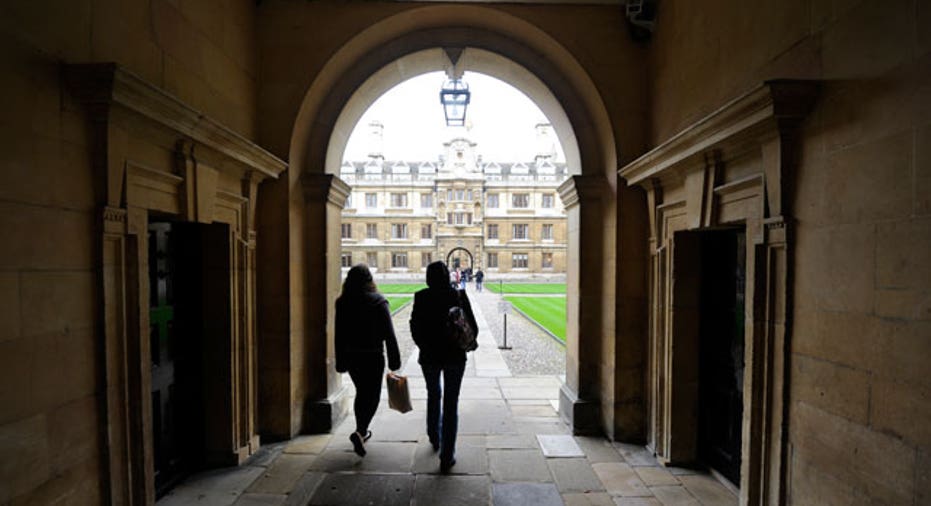Who Applies for Student Loan: You or Your Kid?

Dear Dr. Don,
We have two daughters. The older daughter is a nursing major and in her sophomore year at a private college. The younger daughter is a junior in high school. I am 52 years old.
We have saved enough to put one of them through four years of college, or we can pay for both to go for two years. We don't qualify for any federal grants. I was considering borrowing from the federal government's student loan program or our credit union. We are also considering taking out a home equity loan to pay the balance of the education expense.
Given the new rules for student loans, does it make more sense for the student to take on more of this debt? As I understand the rules, they will be limited to paying back no more than 10% of their income and only for 20 years. Do I understand this correctly?
- Rick Ruminates
Dear Rick,
In October 2011, President Barack Obama proposed a Pay-As-You-Earn plan that would limit some student loan borrower's debt payments at 10% of the student's discretionary income, starting in 2012. Discretionary income is defined by the federal government as anything more than 150% of the poverty level, which varies by the borrower's state of residence and family size. Borrowers making payments under this plan would be eligible to have any remaining student loan balance forgiven after making 20 years of payments.
The Pay-As-You-Earn plan is a modification of the Income-Based Repayment plan that became law in 2010. The earlier plan was slated to reduce the payment cap from 15% to 10% of discretionary income and have loan forgiveness occur after making 25 years of payments.
Keep in mind that payments are capped, not the interest expense, under the president's plan. Extending a 10-year student loan to 20 years will make the payments more affordable but won't necessarily minimize the interest expense or total payments.
There's also a special type of loan forgiveness that occurs after 10 years called Public Service Loan Forgiveness. A nurse could fall into this category. These student borrowers must maintain federally insured student loans, make 120 payments and work full time in an eligible public service job for at least 10 years. The loans need to be nondefaulted loans made under the federal Direct Loan Program, and the 120 payments have to be made under one or more of the Direct Loan Program repayment plans -- Income-Based Repayment, Income Contingent Repayment and Standard Repayment with a 10-year repayment plan. However, loans made under other federal student loan programs may qualify for forgiveness if they are consolidated into a Direct Consolidation Loan. But, only the payments made on the Direct Consolidation Loan will count toward the required 120 monthly payments.
In general, you want your students to borrow under the Direct Student Loan program first before you look to private student loans, personal loans or home equity loans. That's because the Direct Student Loans have low interest rates and the most financial flexibility when it comes to deferment, forbearance or other forms of payment relief. They're also the loans that qualify for the potential payment limitations and loan forgiveness time lines.
I'd encourage parents to consider requiring children to have some skin in the game by having the student take out some Direct Student Loans to finance a part of their education. That's especially true when you're making financial sacrifices like taking out home equity loans to fund your child's education.
If you do borrow for your child's education, don't get a personal loan from your credit union. You should try to borrow from a source where the interest expense is tax-deductible.
There are income limitations concerning the tax deductibility of student loan interest, but they're fairly high. The limit is $150,000 in modified adjusted gross income for a couple filing a joint return. The home equity line of credit or home equity loan may be tax-deductible as well.
Keep the girls in the loop on your strategy. Depending on where you hold the college fund, spending of the fund on the firstborn child might make financial sense -- but it won't make emotional sense. Alternately, since you know the elder daughter's current major, you might want to have her more heavily indebted. She may qualify for that 10-year student loan forgiveness. But keep in mind the forgiveness comes with strings, and that could include her not earning much in her chosen profession while staying current on her student loan payments.
Get more news, money-saving tips and expert advice by signing up for a free Bankrate newsletter.
Bankrate's content, including the guidance of its advice-and-expert columns and this website, is intended only to assist you with financial decisions. The content is broad in scope and does not consider your personal financial situation. Bankrate recommends that you seek the advice of advisers who are fully aware of your individual circumstances before making any final decisions or implementing any financial strategy. Please remember that your use of this website is governed by Bankrate's Terms of Use.



















